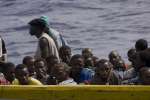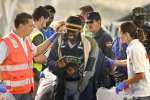Geneva agreement to boost confidence-building measures for Sahrawis
News Stories, 10 February 2011
GENEVA, February 10 (UNHCR) – Talks in Geneva between Morocco and the Polisario Front movement have produced agreement on expanding confidence-building measures to benefit tens of thousands of separated people from the Western Sahara Territory, including more family visits.
"I am really encouraged that, thanks to progress made in this meeting, many more families will finally see each other after a long and painful separation," UN High Commissioner for Refugees António Guterres said at the end of the two-day meeting on Thursday. "For over three decades fathers have been separated from their children, wives from their husbands," he noted.
The talks, organized by UNHCR, brought together officials of the Moroccan government and the Polisario Front, which represents many people from Western Sahara Territory. Also present were officials from the Algerian and Mauritanian governments as well as the UN envoy to Western Sahara, Christopher Ross, and Hany Abdel Aziz, who heads the UN Mission for the Referendum in Western Sahara (MINURSO).
The parties to the talks agreed on six humanitarian measures aimed at allowing more than 30,000 Sahrawis living in Western Sahara or in refugee camps in Algeria to reconnect.
The progress made in Geneva builds on a 2004 plan of action, which introduced the confidence-building measures programme and has seen 13,000 Sahrawis, out of a list of 40,000, reunited for a few days by flights between Western Sahara and Algeria. "I have been able to see personally the vital importance of these measures for the day-to-day life of these people," Guterres said.
Under this week's agreement, UNHCR and MINURSO will in the next few weeks organize a technical assessment mission to map out a route to allow families to be reunited by road for the first time.
It was also agreed that one single list of individuals proposed for UNHCR-run reunion flights will be submitted by the refugee agency to the different parties for approval. This will allow for a pool of pre-cleared candidates, which should speed up the frequency of flights. To date, verification has been done separately for each flight, occasionally leading to delays.
UNHCR was asked to come up with proposals on ways, in the near future, to reactivate a telephone service connecting separated families and to start a postal link. Until it was suspended in September last year, UNHCR supported four telephone centres that handled more than 140,000 telephone calls.
The parties in Geneva also agreed to organize a seminar involving Sahrawis on both sides of the divide as well as regular coordination meetings with all concerned parties.
Sahrawi refugees started arriving in Algeria in 1976 after Spain withdrew from the Western Sahara and fighting broke out over its control. The majority live in four camps in the desert regions of Tindouf. However, some Sahrawis never left the Western Saharan Territory and many families remain separated.
By Sybella Wilkes in Geneva





































